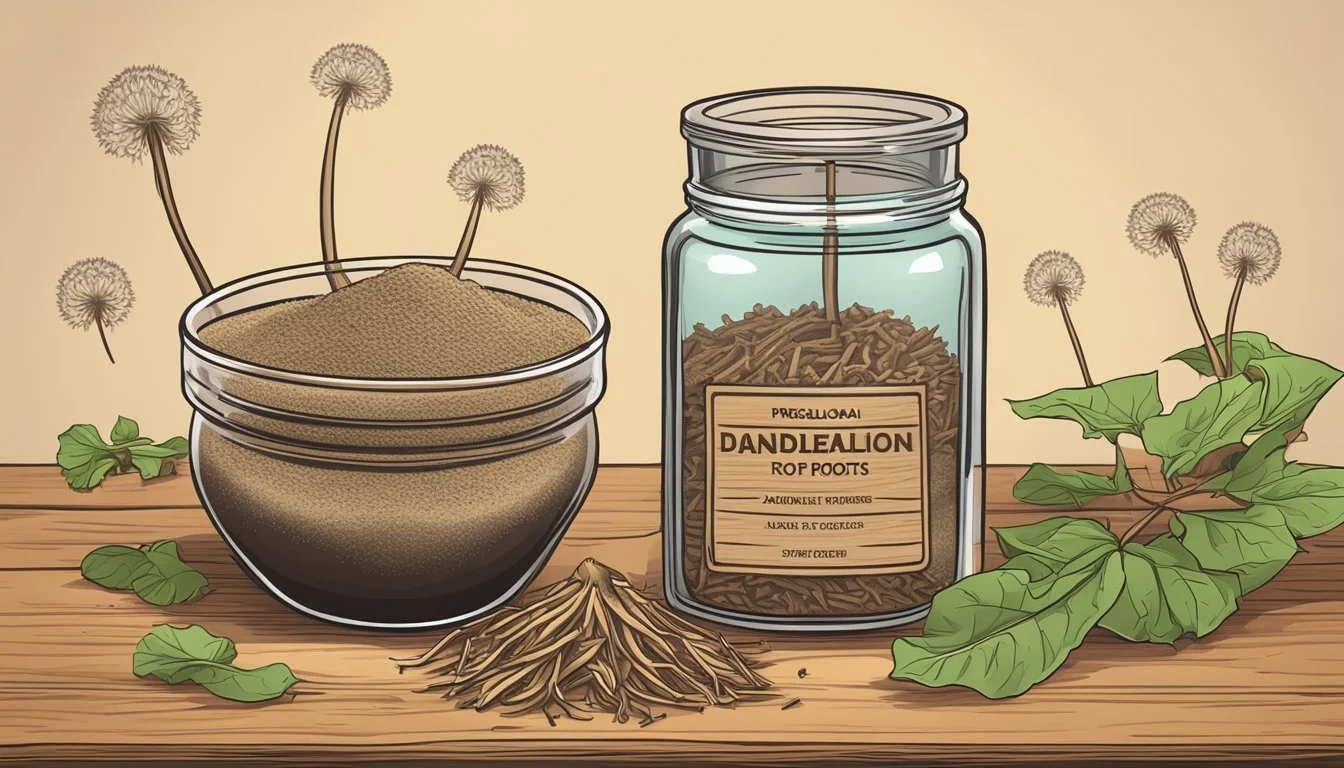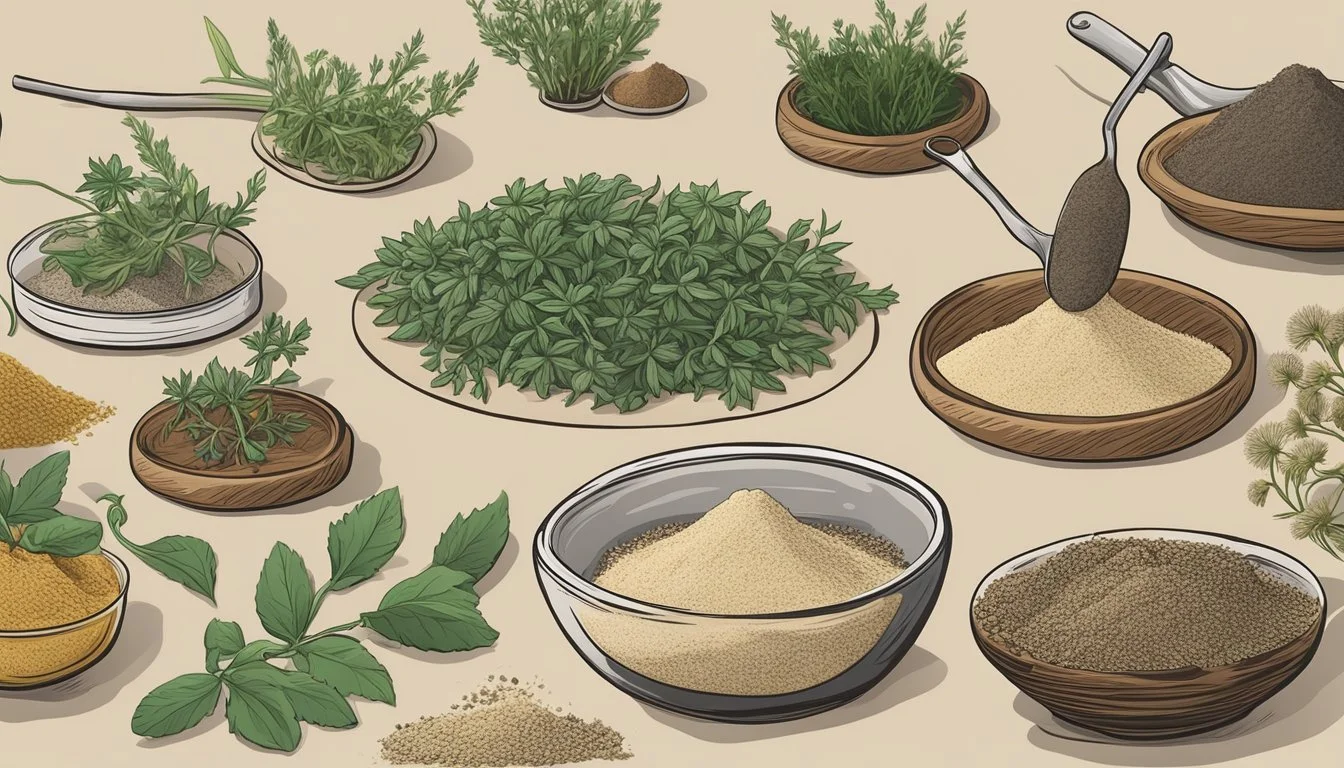Dandelion Root Powder Substitutes
Top Alternatives for Your Health
For those seeking alternatives to dandelion root powder, several substitutes can provide similar benefits and flavors. Chicory root is a popular choice, known for its robust flavor and health benefits, making it an excellent coffee substitute. Roasted barley can also offer a slightly nutty taste and is often used in traditional beverages.
Additionally, roasted carob powder can serve as a caffeine-free alternative and adds a natural sweetness to drinks. Each of these substitutes can be integrated seamlessly into recipes or beverages, allowing for a versatile and enjoyable experience.
While exploring dandelion root powder substitutes, it’s important to consider the specific flavor profiles and potential health benefits they offer. By doing so, one can find the ideal option to suit their dietary needs and preferences.
Overview of Dandelion Root
Dandelion root is notable for its rich nutritional composition and various health benefits. Despite its advantages, it is important to be aware of potential risks and side effects associated with its use.
Nutritional Profile
Dandelion root is packed with essential vitamins and minerals. It is a rich source of vitamin A, C, K, and E, as well as folate, iron, magnesium, and potassium.
Dried dandelion root also contains compounds like taraxasterol and chlorogenic acid, which provide antioxidant properties. These nutrients not only support overall health but also contribute fiber to the diet, aiding in digestive health.
Health Benefits
Dandelion root offers various health benefits. Its antioxidant properties help protect skin cells against damage, potentially slowing signs of aging.
It may also support liver health and promote digestion. Additionally, dandelion root is suggested to aid in managing blood sugar levels and improving insulin sensitivity, important for those with type 2 diabetes.
Furthermore, it is known to reduce inflammation and can promote heart health by lowering blood pressure.
Potential Risks and Side Effects
While dandelion root has many benefits, there are potential risks. Some individuals may experience allergic reactions. Symptoms can include itching, swelling, or difficulty breathing, requiring medical attention.
Dandelion root also acts as a diuretic. This can lead to dehydration if fluid intake is not adequately maintained.
Additionally, it may interact with medications, particularly those related to the liver or heart disease. Therefore, consulting a healthcare provider before use is recommended.
Dandelion Root in Various Forms
Dandelion root can be found in a variety of forms, each with its own unique characteristics and benefits. The forms include hydrated powders, raw roots, and beverages like herbal teas and coffee substitutes.
Hydrated Powder vs. Raw Roots
Dandelion root is often available as a hydrated powder or in its raw form. Hydrated powder is convenient for those who prefer easy incorporation into smoothies or recipes. With a consistent dosage, it ensures reliable intake of nutrients.
Raw roots maintain all their natural compounds and can be used in more versatile ways. They are often included in traditional medicine practices. While raw roots may require more preparation, boiling or roasting can unlock various health benefits.
Each form has a distinct profile. Hydrated powder offers convenience and consistency, while raw roots retain a fuller range of active compounds.
Beverage Alternatives
Dandelion root also functions well as a beverage ingredient. Dandelion tea is a popular herbal tea that carries the root's beneficial properties.
As a coffee substitute, roasted dandelion root provides a similar, robust flavor profile without caffeine. This makes it an excellent alternative for those looking to reduce their caffeine intake.
Both forms serve different preferences: tea drinkers can enjoy a mild, soothing effect, while those who miss coffee can opt for the roasted root version. Whether for detoxification or simply enjoying a warm drink, these beverages offer a practical way to integrate dandelion root into daily routines.
Substitutes for Dandelion Root Powder
Many alternatives to dandelion root powder offer similar benefits, such as antioxidant properties, nutritional content, and flavor. Choices range from chicory root powder to turmeric, providing options for various culinary and health needs.
By Nutritional Content
Chicory Root Powder
Chicory root powder is rich in inulin, a prebiotic fiber beneficial for digestion. It also contains significant levels of polyphenols, contributing to its antioxidant properties.
Turmeric
Turmeric is known for its anti-inflammatory and antioxidant benefits. It contains curcumin, which helps detoxify the body and is used in traditional Chinese medicine.
Licorice Root Powder
Licorice root powder provides various nutrients, including glycyrrhizin, which offers anti-inflammatory effects. It's also a natural remedy for soothing gastrointestinal issues.
By Intended Use
Chicory Root Coffee Substitute
Chicory root is a common coffee substitute, mimicking the rich, earthy flavor of coffee when roasted. It's caffeine-free and can be brewed in the same way.
Turmeric Lattes
Turmeric, mixed with milk and spices, creates a "golden milk" latte. This drink supports anti-inflammatory health benefits and is often used for its detoxifying properties.
Licorice Root Herbal Teas
Licorice root is frequently used in herbal teas for its sweet flavor and therapeutic benefits. Its diuretic properties help cleanse the urinary system.
By Flavor Profile
Chicory Root
Chicory root has a robust, earthy, and slightly nutty flavor that closely matches dandelion root. It adds depth to beverages and foods without caffeine.
Turmeric
Turmeric provides a warm, slightly bitter, and peppery flavor. It pairs well with other spices in lattes and savory dishes, making it an excellent substitute for dandelion root in recipes requiring a strong, distinctive taste.
Licorice Root
Licorice root has a sweet and somewhat bitter profile, different from the earthiness of dandelion root but adding a unique flavor to herbal teas and concoctions.
Choosing the Right Substitute
When selecting a substitute for dandelion root powder, it's important to consider dietary needs and potential health impacts. Different substitutes offer unique benefits, so it's crucial to choose one that aligns with your personal health goals and preferences.
Considerations for Different Diets
For those on a caffeine-free diet, chicory root tea stands out as a strong alternative. It mimics the earthy flavor of dandelion root and supports digestive health.
Individuals looking to manage cholesterol levels may find that chicory root helps in this area as well. It's beneficial for those monitoring their glucose levels, making it a suitable choice for people with diabetes.
Licorice tea offers another excellent option. It's useful for those experiencing digestive and respiratory issues. It also provides a delightful sweetness that balances well without added sugars, making it suitable for various dietary restrictions.
Health Impact
Substitutes like chicory root and licorice tea bring various health benefits. Chicory root contains inulin, a prebiotic fiber that supports gut health and helps in managing cholesterol levels. It also aids in appetite control, promoting weight loss.
Licorice tea has anti-inflammatory properties that can help with heartburn. It supports both digestive and respiratory systems. An added bonus is its potential to regulate blood pressure.
Each substitute interacts differently with the body, so it's essential to choose one that addresses your specific health requirements. Always consult with a healthcare professional before making significant changes to your diet, especially when managing conditions like diabetes or high blood pressure.
Practical Use and Dosage
Dandelion root powder is widely used as both a dietary supplement and a natural remedy, with specific dosage guidelines for optimal results. It's essential to know how much to take and the forms it can be consumed in.
Recommended Dosage
For dandelion root powder, daily doses typically range between 1,500 mg to 3,000 mg. This can be taken as a single dose or divided into multiple doses throughout the day.
When used in tea, it's common to use 1 to 2 teaspoons of dried root, boiled for five to ten minutes. Consume this tea up to three times a day.
For tinctures, a 1:2 dilution ratio is often recommended. Dosage may vary based on individual health conditions and should ideally be guided by a healthcare professional.
Cautions and Interactions
When considering substitutes for dandelion root powder, it is crucial to be aware of potential interactions with medications and pre-existing health conditions. Being informed can help avoid adverse effects and ensure safe usage.
Drug Interactions
Dandelion root powder can interact with several types of medications. Notably, it has diuretic properties, which can enhance the effects of diuretic drugs and potentially lead to dehydration or electrolyte imbalance.
Individuals on blood pressure medications should also be cautious, as dandelion root can affect how these drugs work. There also may be interactions with medications that impact liver function, as dandelion root is known to influence liver activity.
Furthermore, people taking anticoagulants or blood thinners should consult a healthcare provider due to possible interference with blood clotting.
Pre-existing Conditions
Those with pre-existing health conditions should be particularly cautious when using dandelion root powder or its substitutes.
For individuals with kidney problems, the diuretic effects may exacerbate their condition, impacting kidney function. Similarly, those with liver diseases should be cautious as dandelion root influences liver enzyme activity.
People with gastrointestinal disorders such as IBS or GERD may experience aggravated symptoms, including upset stomach or diarrhea. Additionally, those undergoing cancer treatment should consult healthcare professionals before incorporating any herbal supplements due to possible contraindications with their treatment protocols.
Cultural and Historical Context
Dandelion (Taraxacum officinale) has a long history of diverse uses across various cultures, from traditional medicine to modern applications. Its role in detoxification and supporting immune function spans centuries.
Traditional Uses of Dandelion
Dandelion has been used in traditional medicine for centuries. In medieval herbals, it was appreciated for its purported benefits in detoxification and liver health. Many cultures, including Italian, German, and Chinese, included dandelion root in their pharmacopoeias.
The English and Koreans used it for its diuretic properties. Lebanese and Armenians incorporated it into their dietary regimens. Its versatility made it valuable for treating ailments, from digestive issues to infections.
Modern Applications
Modern applications of dandelion root continue to build on its historical uses. It has found a place in numerous products due to its potential antioxidant properties. Scientific studies have explored its effects on immune function, with some research suggesting it may inhibit oxidative stress in blood platelets.
Dandelion root powder is often used as a substitute for coffee due to its rich flavor. This popularity stems from its non-caffeinated profile. Today, it's also included in supplements aimed at liver support and general detoxification, maintaining its status as a prominent herbal remedy.









